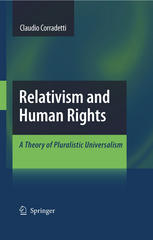

Most ebook files are in PDF format, so you can easily read them using various software such as Foxit Reader or directly on the Google Chrome browser.
Some ebook files are released by publishers in other formats such as .awz, .mobi, .epub, .fb2, etc. You may need to install specific software to read these formats on mobile/PC, such as Calibre.
Please read the tutorial at this link: https://ebookbell.com/faq
We offer FREE conversion to the popular formats you request; however, this may take some time. Therefore, right after payment, please email us, and we will try to provide the service as quickly as possible.
For some exceptional file formats or broken links (if any), please refrain from opening any disputes. Instead, email us first, and we will try to assist within a maximum of 6 hours.
EbookBell Team

4.1
100 reviewsCan human rights principles admit degrees of contextual variations? Are our cultures condemned to a formally rigid standard of universalist hegemony? This work provides an innovative contribution to the legal-philosophical understanding of human rights theory. While advancing a post-metaphysical reconstruction for the notion of human rights, it defends an original perspective on the relation between universal validity and cultural pluralism. By rejecting the challenges of relativism and classical abstract universalism, this model reinterprets discursive theory in the light of dialectical recognition and judgmental exemplarity. The result is an enriched substantive notion of universalism oriented to the safeguard of situated authenticity. Pluralistic universalism considers that, while formal filtering criteria constitute unavoidable requirements for the production of potentially valid arguments, the exemplarity of judgmental activity, in its turn, provides a pluralistic and retrospective reinterpretation for the fixity of such criteria. While speech formal standards grounds the thinnest possible presuppositions we can make as humans, the discursive exemplarity of judgments defends a notion of validity which is both contextually dependent and "subjectively universal". According to this approach, human rights principles are embedded within our linguistic argumentative practice. It is precisely from the intersubjective and dialogical relation among speakers that we come to reflect upon those same conditions of validity of our arguments. Once translated into national and regional constitutional norms, the discursive validity of exemplar judgments postulates the philosophical necessity for an ideal of legal-constitutional pluralism, challenging all those attempts trying to frustrate both horizontal (state to state) and vertical (supra-national-state-social) on-going debates on human rights.